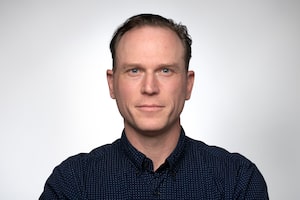A while back, I was early to meet a friend for a drink so sat myself down at the bar, where a group of guys were lined up watching basketball on television, a typical straight-dude activity I don't usually engage in.
After a minute, though, I realized that these guys weren't actually watching; instead, one of them was regaling the others with a story of his romantic-sounding beach vacation in Costa Rica with another guy. Ah, maybe they're gay, I thought.
The guy who was talking was dressed sharply and wearing a wedding band, but neither of those things says much any more. Then, the conversation turned to the porn star Jenna Jameson - okay, so straight after all? - before quickly transitioning to Ms. Jameson's incredible business acumen. Gay?
When my friend showed up half an hour later, I still hadn't discerned the sexual orientation of any of them. In fact, outside of the Gay Pride celebrations that take place across Canada in July and August - or inside of a gay club, I suppose - it's continuing to become harder to tell who is gay and who is just, as a New York Times article once put it, "gay-vague." And, I thought, I'm one of the people responsible for that.
I've been told more than once that I speak with a vaguely gay accent; I can be quite physically affectionate with other guys, and I like to dance. One gay friend joked that I fit the definition of gay as once defined in an old Seinfeld episode: "thin, single and neat." (I do try to dress well, but he's never seen my apartment. Neat would not be the first word to describe it.)
Despite the pick-up scene confusion that vaguely gay straight men can cause, the trend is a good thing, according to Eric Anderson, an American sociologist who studies masculinity at the University of Bath in Britain. Metrosexuality, he says, is a sign that heterosexual men are increasingly able to separate their sexual orientation from the performance of their masculinity.
"It's given us much more freedom to choose activities - sports, music, entertainment - that we desire without being marginalized," he says, "without being called a fag and beaten up because you'd prefer to watch Glee than football."
Additionally, Dr. Anderson says the shedding of this need to prove one's heterosexuality - something that he points out is never actually possible and must be re-proved on a daily basis - means that men are more likely to turn down fights or even oppose violence on a political scale. "Hopefully, it means that there's less violence towards women as well," he said.
As much as I've intellectually been a supporter of broadening the definition of manliness and of not expressing heterosexuality through a Rambo-style overcompensation, the fact is I haven't always been comfortable with my own gay-vagueness.
I briefly tried to alter the pitch and inflection of my voice to sound more declarative and bullying - qualities I'd identified as more obviously straight - and even more briefly tried not to bop my head to a new Madonna track. My body rebelled on both counts.
Dr. Anderson says my conflicted feelings about being an agent of metrosexuality likely stem from the time period in which I went through adolescence. He calls the early nineties the "tail end of the peak of the worst period of homophobia in North American history." The apex of the period was 1988, he says, blaming the emergence of AIDS, the rise of televised Sunday sermons that promoted "homo hysteria" as a fundraising technique, and the presence of socially conservative governments in the United States and Britain.
"You get emotionally stamped with the culture of that time," says Dr. Anderson of one's formative years. "This is why the biggest changing factor for social movements is old people dying."
All this said, I was pleased to talk to a couple of guys my age who have always had gay-vague pride. One friend, who says he's also been told he "sounds a little gay" and has had people wonder behind his back if his marriage to a woman is a sham, says he's never tried to be any different. "I still dance. I still like sparkles. I haven't changed my behaviour at all," he says.
Another person I talked to says he's mistaken as gay for the most traditional reason - he's really into fashion and shops a lot.
"I've never had a problem with it," says Mr. Fashion of his gay-vagueness. "I will always embrace it. I think it's a positive in some sense. It separates you from a lot of people."
He even claims it helps him pick up women. "They let their guard down," he says. "They think, 'This guy is gay so maybe he's not going to try to sleep with me … but then wait, no, maybe he is.' " By then, he says, she's already charmed.
A week ago, a gay man on Twitter hilariously came down on the gay-vague trend, writing: "Abolish metrosexualism. Go homo or go home."
When I tracked him down, he softened his position - he supports those who identify as "queer" instead of choosing one of the Big Two - but he says his dictum would simply make it easier for gay guys looking to pick up.
I told him Dr. Anderson had suggested that, in the end, we can always rely on eye contact.
"Yeah, but sometimes eye contact can get you a sock in the face," he said. I can see his concern.
The best one can hope for, I suppose, is that the growing generations of men born without the stamp of homo hysteria on them can teach the rest of us how to behave.
Micah Toub's memoir, Growing Up Jung: Coming of Age as the Son of Two Shrinks, will be published in the fall of 2010.
 Micah Toub
Micah Toub